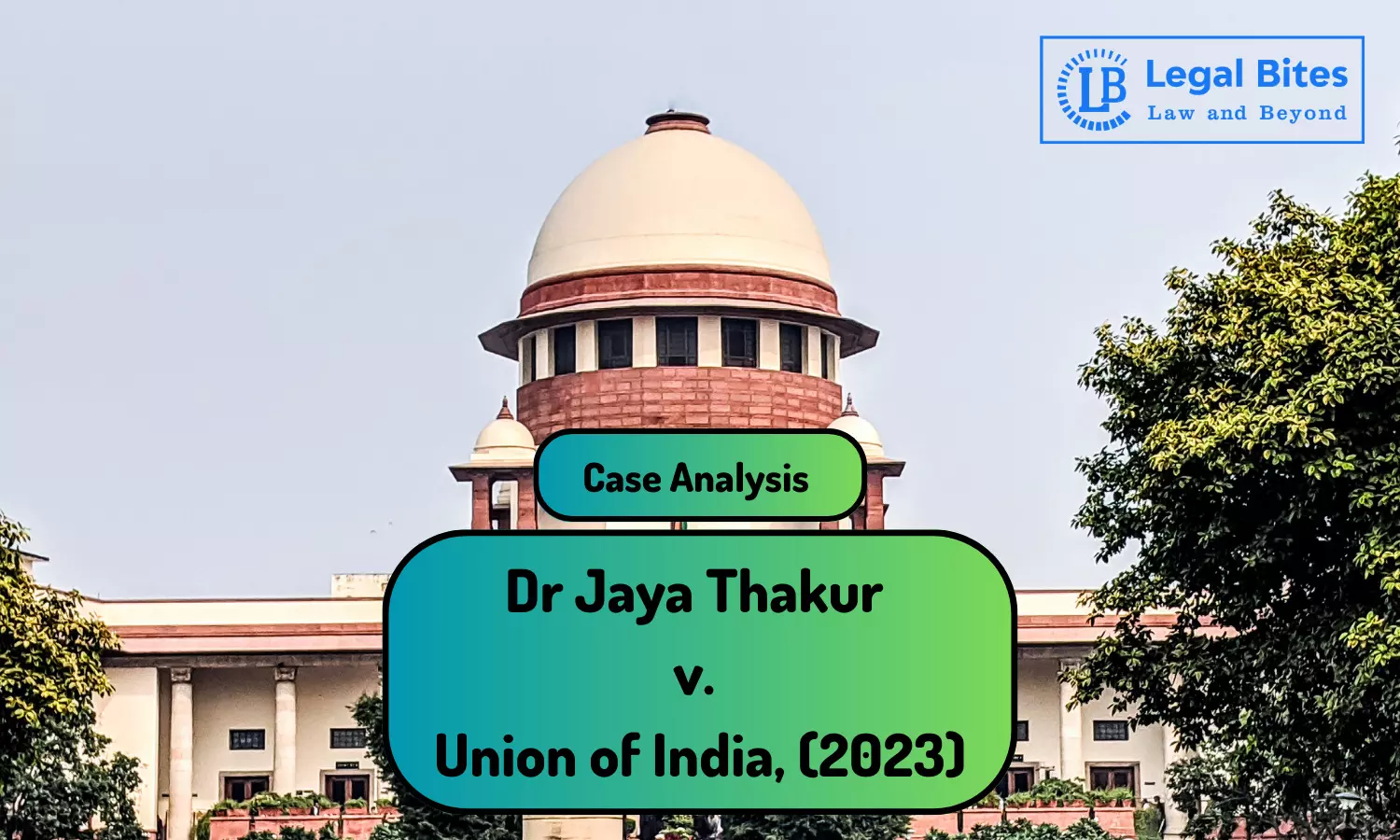Case Analysis: Dr Jaya Thakur v. Union of India, (2023) | Menstrual Hygiene
The Case Analysis 'Dr. Jaya Thakur v. Union of India (2023)' elaborates upon how menstrual hygiene was held to be a sensitive topic and why appropriate emphasis shall be given to the same by Government.

The Case Analysis 'DrJaya Thakur v. Union of India, (2023)' elaborates upon how menstrual hygiene was held to be a sensitive topic and why appropriate emphasis shall be given to the same by Government.The Supreme Court of India, through the Bench comprising of Chief Justice DY Chandrachud, Justices PS Narasimha and JB Pardi Wala on 10.04.2023, directed the Central government to implement a uniform national policy on menstrual hygiene, including the distribution of free menstrual pads and...
The Case Analysis 'DrJaya Thakur v. Union of India, (2023)' elaborates upon how menstrual hygiene was held to be a sensitive topic and why appropriate emphasis shall be given to the same by Government.
The Supreme Court of India, through the Bench comprising of Chief Justice DY Chandrachud, Justices PS Narasimha and JB Pardi Wala on 10.04.2023, directed the Central government to implement a uniform national policy on menstrual hygiene, including the distribution of free menstrual pads and cups to students.
Case Title: Dr Jaya Thakur v. Union of India
Court: Supreme Court of India
Citation: W.P.(C) No. 001000 - 001000/2022
Judges: Chief Justice DY Chandrachud, Justices PS Narasimha and JB Pardi Wala
Date: 10.04.2023
Facts of the Case
A Public Interest Litigation (PIL) filed by Congress leader and social worker Dr Jaya Thakur, in public interest seeking direction to the Respondents, the Union of India, the States and Union Territories to ensure free sanitary pads and better toilets for school girls as consequential relief from Union government and the Government of the States/Union Territories.
Issues Involved
The main issues involved in this case which had to be adjudicated upon by the Hon’ble Supreme Court of India were:
(i) Whether free sanitary pads shall be provided to every female child studying between classes 6 to 12? and
(ii) A separate toilet for females in all government-aided and residential schools. Apart from this, certain other consequential reliefs have also been sought including the maintenance of toilets and the spread of awareness programmes.
Laws Applied
In order to adjudicate the said case, the Hon’ble Supreme Court made reference to the rights that are guaranteed under Article 32 of the Constitution of India and the Hon’ble Court was of the view that the reliefs which have been sought in the petition under Article 32 are not exhaustive of the subject, the petition raises important issues of public interest bearing on the need for sanitation and menstrual hygiene for females who are studying in schools.
Judgment/Decision
While passing an order in the said case the Hon’ble Court was of the considered view that it would be appropriate if the Union Government engages with all the State governments and Union Territories to ensure that a uniform national policy is formulated with sufficient leeway for the States and Union Territories to make adjustments, based on the prevailing conditions in their territories.
Bearing in mind the importance of the issue which has been raised, the Hon’ble Court directed that all States and Union Territories must submit their menstrual hygiene management strategies and plans which are being executed either with the help of funds provided by the Central Government or through their own funds to the Mission Steering Group of the National Health Mission within a period of four weeks.
The Hon’ble Court was of the considered view that the Mission Steering Group shall re-evaluate the national guidelines based on the experiential learning of the previous decade or so. For this purpose, we nominate the Secretary of the Ministry of Health and Family Welfare as the nodal officer to facilitate coordination with all the other Ministries of the Union and with the State governments and the Union Territories.
Apart from the above direction, The Hon’ble Court also directed that the States and Union Territories shall also indicate to the Mission Steering Group of the National Health Mission, the appropriate ratio of female toilets for residential and non-residential schools for their respective territories. All States and Union Territories shall also indicate the steps which have been taken to provide for the availability of low-cost sanitary pads and vending machines in schools and for appropriate disposal mechanisms.
The Hon’ble Court also emphasised that besides making a provision for ensuring the availability of low-cost sanitary pads and vending machines in all schools, they shall also ensure that disposal mechanisms are available in schools /school complexes with an enrolment of female students in upper primary, and secondary, and higher secondary classes for safe disposal of sanitary pads.
The Union Government has been directed to submit an updated status report before the Hon’ble Court within a timeframe of three months.
Important Links
Law Library: Notes and Study Material for LLB, LLM, Judiciary, and Entrance Exams

Snehil Sharma
Snehil Sharma is an advocate with an LL.M specializing in Business Law. He is a legal research aficionado and is actively indulged in legal content creation. His forte is researching on contemporary legal issues.

